Select Language

(Reuters) - The interest rate for the most popular U.S. home loan rose to 6.36% last week, marking the biggest weekly increase in more than a year after better-than-expected economic data caused financial markets to scale back bets on further Federal Reserve interest-rate cuts.
The average contract rate on a 30-year fixed-rate mortgage rose 22 basis points in the week ended Oct. 4, the Mortgage Bankers Association said on Wednesday. The last time it rose that much was in July 2023, when the Fed was still increasing interest rates in its battle to bring down inflation.
The U.S. central bank began cutting its short-term benchmark rate last month, signaling confidence that inflation is headed toward its 2% goal with a bigger-than-expected reduction of half a percentage point aimed at keeping a cooling labor market from weakening further.
Mortgage rates had peaked in October 2023, near 8%, and by the time of the Fed's September policy-setting meeting had fallen by more than 1.75 percentage points in anticipation of the Fed's pivot to policy easing.
Last week's jump puts the home borrowing rate back up where it was in late August, before the Fed's rate cut.
The 30-year rate closely tracks the yield on the 10-year Treasury note, which rose sharply last week after a government report showed job growth jumped in September and the unemployment rate fell.
The strong showing eased concerns that the labor market was cooling too sharply. Traders moved to price in smaller, and fewer, Fed rate cuts over coming months than they had previously anticipated.
Financial market bets now reflect an expectation that the Fed will reduce its policy rate, now in the 4.75%-5.00% range, to a range of 3.50%-3.75% by the middle of next year.
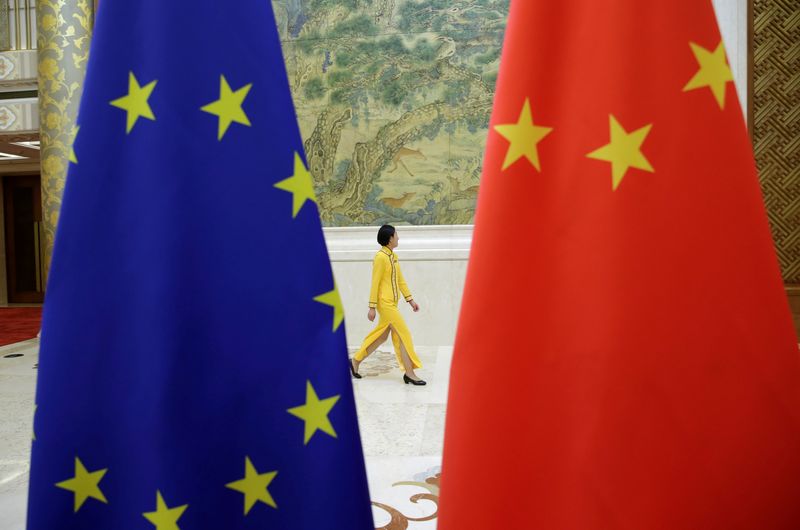
BEIJING (Reuters) -China on Tuesday announced provisional anti-dumping measures on brandy imports from the European Union, according to a statement from the Chinese commerce ministry, reversing an earlier move amid continued tense trade talks.
From Oct. 11, importers will be required to provide what the ministry described as a corresponding security deposit to Chinese customs when importing relevant brandies originating in the EU.
The move was an about-turn after Beijing recently said it would not impose provisional tariffs on brandy imported from the EU despite finding it had been sold in China below market prices.
That was supposed to give both sides some breathing room in their ongoing heated trade talks.
Previously, when the commerce ministry decided not to improse provisonal anti-dumping measures it had said that probe would end before Jan. 5, 2025, but that it could be extended.
China had recently been trying to drum up support from the bloc's 27-member states to reject the European Commission's proposal to adopt hefty added tariffs on Chinese-made electric vehicles in a vote expected soon.
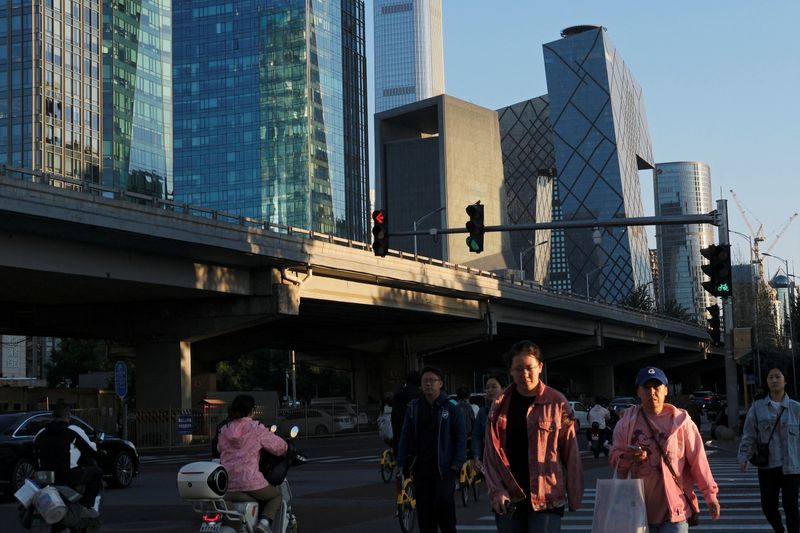
By Kevin Yao and Joe Cash
BEIJING (Reuters) -China is "fully confident" of achieving its full-year economic and social development targets, with some funds from 2025's budget being brought forward to support projects, chairman of the country's economic planner Zheng Shanjie said on Tuesday.
China stocks blasted to two-year highs after a slew of stimulus steps announced in recent weeks supported sentiment in early trade, but later retreated. Hong Kong shares also slid as investors walked back some of the stimulus excitement.
Zheng, chairman of the National Development and Reform Commission (NDRC), told a press conference China's economy remains largely stable but is facing more complex internal and external environments.
"The international market is volatile, global trade protectionism has intensified, and uncertain and unstable factors have increased. These will have an adverse impact on my country through trade, investment, finance and other channels," Zheng said.
Downward pressure on the domestic economy has increased, he added.
To support local governments, China will issue 100 billion yuan ($14.12 billion) from next year's central government budget and another 100 billion yuan for key investment projects by the end of this year, Zheng said.
The country will also quicken fiscal spending and "all sides should keep making efforts more forcefully" to strengthen macroeconomic policies, he added.
Investors and economists expect more policy support on the fiscal side to sustain the market's optimism. They said it will take time to restore consumer and business confidence and get the economy back on more solid footing. A housing market recovery, in particular, could be a long slog.
"We anticipate that the government will arrange 1-3 trillion yuan of additional fiscal support this year and next to boost the real economy, recapitalise banks, and stabilise the property market," said Yue Su, principal China economist at the Economist Intelligence Unit.
"This, along with investments from special long-term bonds planned for next year, is expected to primarily impact 2025's economic growth."
The government set a growth target of around 5% this year, but economic indicators showed growth momentum waned since the second quarter, weighing on households spending and business sentiment amid a severe property downturn.
A private report by recruiting platform Zhaopin showed on Tuesday that average pay offered by recruiters in China's 38 major cities fell 2.5% in the third quarter from the second, and down 0.6% from a year earlier.
In an effort to reverse the economic downturn, China unveiled in late September its most aggressive monetary stimuluspackage since the COVID-19 pandemic, coupled with extensive property market support.
Zheng said that to address insufficient domestic demand, policymakers will focus on enhancing people's livelihood to stimulate consumption and investment, such as supporting disadvantaged people, consumer goods trade-ins, elderly care and births. No further details were announced.
Vice Chairman of the NDRC, Liu Sushe, stated that most of the 6 trillion yuan in government investment this year was allocated to specific projects, with 90% of local government special bonds used for project construction issued by September.
At the same press conference, another vice chairman of the NDRC, Zhao Chenxin, said that China's economic growth remained "generally stable" over the first three quarters.
($1 = 7.0805 Chinese yuan)

By Hyunjoo Jin, Heekyong Yang and Joyce Lee
SEOUL (Reuters) -Samsung Electronics warned its third-quarter profit would come in below market expectations and apologised for the disappointing performance with the tech giant lagging its rivals in supplying high-end chips to Nvidia (NASDAQ:NVDA) in the booming AI market.
Samsung said its AI chip business with an unidentified major customer was hit by a delay, while Chinese chip rivals increased supplies of conventional chips, contributing to the decline in its semiconductor earnings.
The comments illustrate the challenges facing the company, which has been the world's biggest memory chipmaker for three decades but is battling growing competition in both conventional and advanced chips.
The world's largest memory chip, smartphone and TV maker estimated an operating profit of 9.1 trillion won ($6.78 billion) for the three months ended Sept. 30, versus a 10.3 trillion won LSEG SmartEstimate.
That would compare with 2.43 trillion won in the same period a year earlier and 10.44 trillion won in the preceding quarter.
"The earnings are a shock compared to what many analysts expected initially," said Lee Min-hee, an analyst at BNK Investment & Securities.
"I don’t see its earnings improving in the current quarter," he said, saying it lags SK Hynix in increasing sales of high bandwidth memory (HBM) chips to Nvidia and its high exposure to the Chinese market hurts.
Samsung's late response to the AI chip market increases its reliance on traditional, lower-margin chips, making it more vulnerable to competition from China and slowing demand for smartphones and PCs, analysts say.
High-margin chips used in AI servers are driving a recovery in the chip market after a post-pandemic downturn last year. Still, Samsung has lagged SK Hynix in supplying high-bandwidth memory (HBM) chips to AI leader Nvidia.
"We have caused concerns about our technological competitiveness, with some talking about the crisis facing Samsung," Young Hyun Jun, Vice Chairman, Device Solutions Division, Samsung Electronics (KS:005930), said.
"These are testing times," he said, pledging to turn the challenge into an opportunity and focus on enhancing long-term technological competitiveness.
Samsung's share price, already down more than 20% so far this year, fell 1.6% after the earnings guidance.
HBM CHIPS DELAYED
Samsung said in a statement the start of sales of its high-end HBM3E chips to a major customer "was delayed relative to our expectations". It did not elaborate on the issue.
Earnings declined in the company's memory chip business as Chinese rivals increased supplies of "legacy" products and some mobile customers adjusted inventories, offsetting solid demand for HBM and other chips used in servers, Samsung added.
Samsung's contract chip manufacturing business, which designs and produces custom-made chips for other companies, likely continued to lose money in the third quarter as it is struggling to compete with leader TSMC, which counts Apple (NASDAQ:AAPL) and Nvidia among its customers, analysts said.
Samsung's chief Jay Y. Lee told Reuters on Monday that he is not interested in spinning off the contract chip manufacturing business as well as its logic chip designing operation.
Samsung said one-off costs such as provisions for "incentives" and the unfavourable local currency also contributed to the chip earnings decline.
Earnings in its mobile division improved from the preceding quarter on solid sales of its flagship smartphones, while earnings at its display unit grew as its customers, which include Apple, launched new models.
Samsung will announce detailed earnings results later this month.
In May, Samsung abruptly replaced the chief of its semiconductor division, handing the reins to Jun in a bid to overcome a "chip crisis".
Samsung is also cutting as much as 30% of overseas staff at some divisions, Reuters reported in September, underscoring the challenges it faces.
Its U.S. rival Micron (NASDAQ:MU) last month forecast first-quarter earnings ahead of Wall Street estimates and reported its highest quarterly revenue in over a decade on the back of booming demand for its memory chips used in AI.
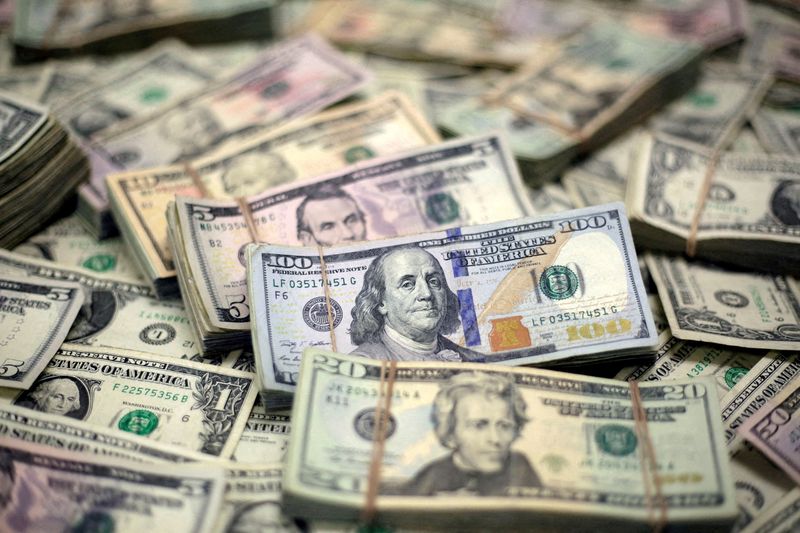
By Ankur Banerjee
SINGAPORE (Reuters) - The dollar clung to seven-week highs against major currencies on Tuesday as investors ponder the outlook for U.S. rates after a strong jobs report last week dashed bets for large rate cuts, while escalating tensions in Middle East dented risk sentiment.
Traders have drastically shifted their monetary easing expectations from the Federal Reserve this year.
Markets are no longer fully pricing in a rate cut in November and are ascribing an 86% chance of a 25 basis points (bps) reduction, the CME FedWatch tool showed. Just 50 bps of easing is priced in by December, down from over 70 bps just a week earlier.
That has kept the dollar on the front foot and surging to a multi-week high against the euro, sterling and the yen.
The dollar index, which measures the U.S. unit against major rivals, last fetched 102.41, just below the seven-week high of 102.69 it touched on Friday.
A shallower path of cuts from the Fed, coupled with strong data and the prospect of a 'no landing' scenario has helped support the dollar, said Kieran Williams, head of Asia FX at InTouch Capital Markets.
"While the USD has room to strengthen from here, given the hawkish repricing post-FOMC other catalysts may be necessary."
Federal Reserve Bank of St. Louis President Alberto Musalem said on Monday he supports more interest rate cuts as the economy moves forward on a healthy path, while noting that it is appropriate for the central bank to be cautious and not overdo the monetary easing.
"Further gradual reductions in the policy rate will likely be appropriate over time," the official said.
The benchmark 10-year U.S. Treasury yield remained above 4% in Asian hours, having touched the level on Monday for the first time in two months as traders curtailed wagers on super-sized rate cuts. [US/]
Investor focus this week will be on the inflation report due on Thursday as well as the minutes of the Federal Reserve's September meeting scheduled to be released on Wednesday. China markets are also due to open after a week-long holidays.
China's offshore yuan strengthened a bit to 7.0594 per dollar in early trading.
The euro fetched $1.098175 in early trading, not far from the seven week low of $1.09515 it hit last week. The pound was at $1.3095, close to the over three week low of $1.30595 it touched on Monday.
The yen was slightly stronger at 147.795 per dollar in early trading having also slumped to a seven week low of 149.10 on Monday as traders contemplated the interest rate path that the Bank of Japan is likely to take in the near term.
New Japanese premier Shigeru Ishiba stunned markets last week when he said the economy was not ready for further rate hikes, an apparent about-face from his previous support for the BOJ unwinding decades of extreme monetary stimulus.
Those comments pushed the yen lower and has cast doubts over how aggressive the BOJ would be in raising rates.
In other currencies, the Australian dollar was a tad stronger at $0.6768.
The New Zealand dollar was 0.3% higher at $0.6144 ahead of the monetary policy decision on Wednesday. A majority of economists in a Reuters poll last week said the Reserve Bank of New Zealand will cut interest rate by 50 basis points.

LONDON (Reuters) - British firms have grown more downbeat about the outlook as concerns about the tax impact of the new Labour government's upcoming autumn budget and conflict in the Middle East dampened sentiment, a survey showed on Tuesday.
The British Chambers of Commerce said 48% of 5,152 companies it surveyed between Aug. 19 and Sept. 16 reported that taxation was a main area of concern ahead of the budget. This is up from 36% in the previous survey.
"Many businesses are increasingly anxious about the direction of economic policy, and taxation has now become their primary concern," David Bharier, BCC head of research, said. "The major escalation in the Middle East conflict will also be a significant factor."
British finance minister Rachel Reeves, who is due to make her inaugural tax-and-spending autumn statement, has warned some taxes might increase in the Oct. 30 budget.
Reeves is expected to change the government's fiscal rules for bringing down public debt, which could pave the way for more borrowing, potentially helping to boost investment and economic growth.
British government debt in August hit 100% of economic output - levels not seen on a sustained basis since the early 1960s.
The BCC survey showed 56% of businesses expected turnover to increase over the next 12 months, down from 58% in the second quarter, and most no longer expected profits to rise.
Just over one in five said they had increased investment.
"Investment levels remain the Achilles heel of the UK economy. Despite interest rates starting to fall and inflation easing, most SMEs (small and medium-sized firms) are still hesitant to invest," Bharier said.
Worries about interest rates and inflation continued to decline, the BCC said.
The Bank of England is expected to reduce borrowing costs at its next meeting in November after its first cut in more than four years in August and a pause in September.
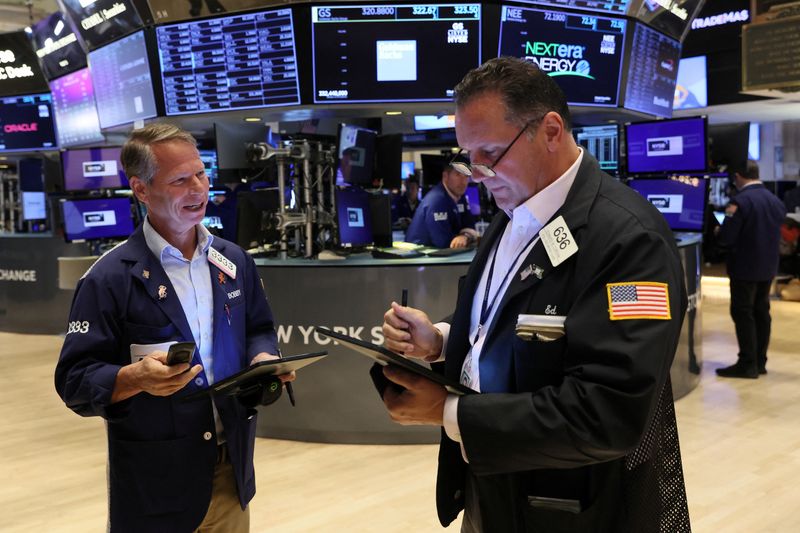
Investing.com -- US stock futures edge lower following a Friday spike on Wall Street that was fueled by a strong jobs report. Markets are now gearing up for fresh inflation data which could provide more clarity on the path ahead for Federal Reserve interest rate policy in the coming months. Elsewhere, global miner Rio Tinto (NYSE:RIO) confirms a takeover bid for US-based Arcadium Lithium .
1. Futures lower
US stock futures pointed lower on Monday following a rally in the prior session sparked by a bumper September employment report.
By 03:28 ET (07:28 GMT), the Dow futures contract had shed 89 points or 0.2%, S&P 500 futures had fallen by 13 points or 0.2%, and Nasdaq 100 futures had dipped by 46 points or 0.2%.
On Friday, the main averages on Wall Street jumped after Labor Department figures showed that the US economy added far more jobs than anticipated last month. The numbers bolstered hopes that the the world's largest economy was on solid footing heading into the fourth quarter.
Although the reading dented projections that the Federal Reserve would roll out another jumbo 50-basis point interest rate reduction at its final meetings this year, it served to boost the idea that the central bank was on course to achieve a so-called "soft landing" -- a scenario in which elevated inflation is successfully quelled without a igniting a wider downturn in the economy or jobs market.
The 30-stock Dow Jones Industrial Average posted a record closing high, while the tech-heavy Nasdaq Composite added 1.2% and the benchmark S&P 500 grew by 51 points or 0.9%. The increases also helped the major indices eke out a fourth consecutive positive week.
2. Data, earnings ahead this week
Investors will have more economic data to pour over this week, as well as a raft of new quarterly corporate earnings.
Thursday’s consumer price index (CPI) data for September is expected to show that price pressures continued to moderate at the end of the third quarter. The data, coming on the heels of Friday’s robust jobs report is likely to shape expectations around the size and pace of Fed rate cuts in the coming months.
Producer price inflation data on Friday is also expected to point to tamer inflationary pressures.
“CPI for September will be a key data release. If prices rise faster than expected on top of the stronger labor data, chances for the Fed to skip the November meeting will increase,” analysts at UBS said in a recent note.
Meanwhile, US third-quarter earnings season is about to kick into gear, in what will be a test for a stock market near record highs and trading at lofty valuations.
Major financial firms -- including JPMorgan Chase (NYSE:JPM), Wells Fargo (NYSE:WFC) and BlackRock (NYSE:BLK) -- are all due to report on Friday.
3. Rio Tinto confirms approach to acquire Arcadium Lithium
Mining giant Rio Tinto (LON:RIO) has made an approach to purchase lithium producer Arcadium Lithium (NYSE:ALTM), the companies announced in separate statements on Monday.
Both groups said the approach was "non-binding," adding that they would divulge more about a potential deal when they had "news to share."
Should it be completed, the agreement would make Rio Tinto one of the world's biggest producers of lithium, the ultralight metal essential in powering electric vehicle batteries and power storage. Prior to the announcement, media reports had speculated that Rio may pursue a bid following months of slumping lithium prices due in part to oversupply in China and weaker EV demand.
No financial details were provided, but Arcadium Lithium has a market capitalization of around $3.3 billion. Shares in the Philadelphia-based firm surged by more than 35% in extended hours trading.
Reuters previously reported the discussions on Friday, saying that Arcadium could be valued at between $4 billion to $6 billion or higher.
4. Activist investor Starboard Value takes stake in Pfizer - WSJ
Activist investor Starboard Value has taken a stake in Pfizer (NYSE:PFE) worth around $1 billion as part of a bid to overhaul the pharmaceutical company, The Wall Street Journal reported on Sunday.
Starboard has approached two former Pfizer executives -- ex-CEO Ian Read and ex-CFO Frank D'Amelio -- to help in the process, the paper added, citing people familiar with the matter.
The report comes as Pfizer's leadership team is facing growing calls to turn around its recently flagging performance. The drugmaker was a key COVID-19 vaccine manufacturer during the pandemic, but it has struggled to plug a subsequent sales gap as the health crisis has abated. In late-2023, Pfizer issued a revenue warning and a disappointing 2024 outlook, along with a $3.5 billion cost-cutting drive.
Shares in Pfizer, which are now trading below pre-pandemic levels, were only modestly higher in after-hours dealmaking following the report.
5. Oil choppy
Oil prices were choppy on Monday following hefty gains posted in the previous week, as traders eye ongoing tensions in the Middle East.
By 03:28 ET, the Brent contract had risen by 0.5% to $78.47 per barrel, while U.S. crude futures (WTI) traded 0.8% higher at $74.94 a barrel.
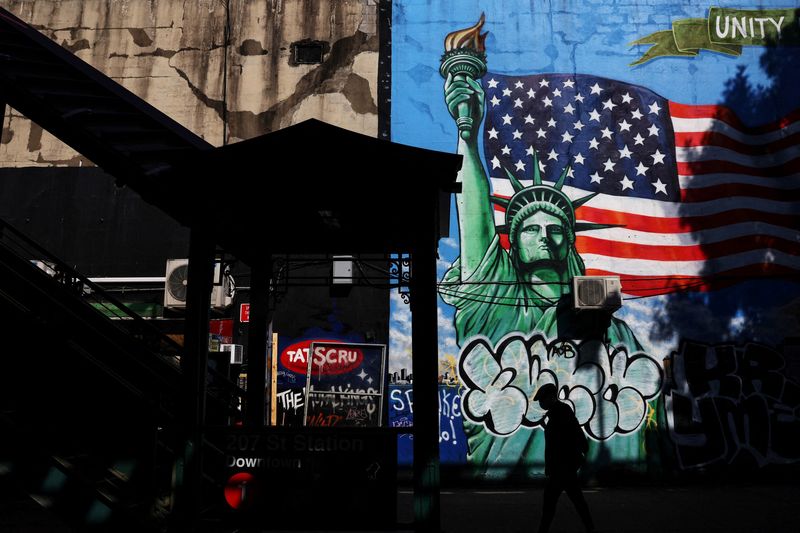
By Saqib Iqbal Ahmed and Lewis Krauskopf
NEW YORK (Reuters) - The reverberations from a blowout U.S. employment number could threaten an assortment of trades predicated on falling interest rates, if stronger-than-expected growth spurs investors to radically shift views on how much the Federal Reserve will need to cut borrowing costs in the months ahead.
Expectations of steep rate cuts spurred bets on everything from rising Treasury prices to a weaker dollar in recent months, while juicing corners of the stock market such as utilities. The Fed delivered a jumbo-sized 50 basis-point cut last month, temporarily vindicating that view.
But the trajectory of rates is less certain after Friday’s labor market report, which showed the U.S. economy creating over 100,000 more jobs than expected last month. That suggests there is less need for more large cuts this year and raises the prospects of a reversal in many of the trades that hinged on lower rates.
Futures tied to the fed funds rate on Friday showed traders had ruled out another 50 basis-point cut at the central bank’s November meeting. Market pricing on Thursday reflected a greater than 30% chance for such a cut, according to CME FedWatch.
Here is a look at some corners of the market that could be affected in a rates rethink.
DOLLAR REBOUND
Net bets on a weaker dollar stood at $12.91 billion in futures markets last week, the highest level in about a year, data from the Commodity Futures Trading Commission showed, after the dollar notched its worst quarter in nearly two years.

SHANGHAI (Reuters) - China's central bank held back on buying gold for its reserves for a fifth straight month in September, official data showed on Monday, mainly due to a surge in prices for the yellow metal.
China's gold holdings stood at 72.8 million troy ounces at the end of last month. The value of the gold reserves, however, rose to $191.47 billion from $182.98 billion at the end of August.
Gold prices have risen around 28% so far this year - heading for the biggest annual gain in 14 years - underpinned by the start of U.S. Federal Reserve interest rate cuts, geopolitical tensions and robust demand from central banks.
Global central banks, which actively bought gold in 2022-2023, are on track to slow purchases in 2024 from 2023, according to the World Gold Council, but to keep them above the pre-2022 level.
This is partly due to the pause in purchases by the People's Bank of China (PBOC), which until May had bought gold for 18 consecutive months.
The central bank was the world's largest official sector buyer of gold in 2023 and its decision to put its buying on hold muted Chinese investor demand in recent months. "With higher gold prices, the PBOC continues to pause from new purchases. We believe the central bank would like more gold but is waiting for a more attractive entry point," said WisdomTree commodity strategist Nitesh Shah.
"However, with global interest rates falling and geopolitical tensions rising, it looks like they may have to wait for some time for a price dip. Given our forecast of prices rising to over $3,000/oz in the coming year, the central bank may want to consider building positions earlier."
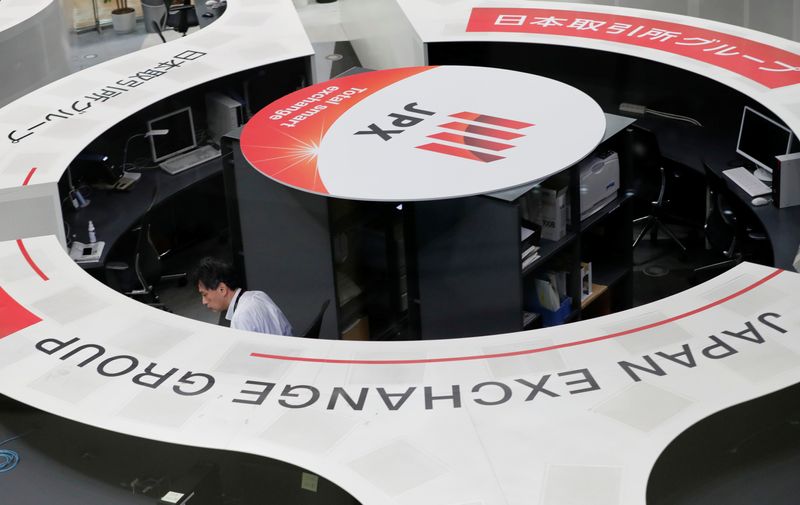
By Kevin Buckland
TOKYO (Reuters) - Asian stocks rallied and the dollar reached a fresh seven-week peak on the yen on Monday after blowout U.S. labour data dispelled fears of a recession and spurred a sharp paring of rate-cut bets.
Short-term U.S. Treasury yields rose after the closely watched non-farm payrolls report on Friday showed the economy unexpectedly added the most jobs in six months in September.
Crude oil prices eased from a one-month peak even as Israel bombed targets in Lebanon and the Gaza Strip, with Monday marking one year since the Hamas attack that triggered the war.
Japan's Nikkei led regional equity gains with a 2% rally as of 0015 GMT, given additional momentum by the softer yen.
Australia's stock benchmark added 0.12% and South Korea's Kospi gained 0.29%.
Hong Kong's Hang Seng had yet to open, and mainland Chinese stocks remain closed until Tuesday for the Golden Week holiday.
MSCI's broadest index of Asia-Pacific shares climbed 0.4%.
U.S. Dow futures pointed 0.08% higher after the cash index closed at an all-time peak after the payrolls data on Friday.
"The reaction in markets conveys what the key themes and risks for market participants are presently: economic growth, and its impact - for equities - on future earnings," said Kyle Rodda, senior financial market analyst at Capital.com.
"There's also seemingly a revival of the U.S. economic exceptionalism trade."
The U.S. dollar pushed as high as 149.10 yen for the first time since Aug. 16 before last trading hands up 0.18% at 148.87 yen.
Japan's top currency diplomat, Atsushi Mimura, said on Monday that officials will monitor foreign exchange moves, including speculative trading.
The euro eased 0.07% to $1.0971, slipping back towards Friday's seven-week trough at $1.09515.
Bets for a super-sized 50-basis-point rate cut at the Federal Reserve's next policy announcement on Nov. 7 - which had been above 50% a week ago - were completely erased after the payrolls report.
Instead, traders now lay 95% odds on a quarter-point cut, with a small chance that the policy rate stays unchanged, according to CME Group's (NASDAQ:CME) FedWatch Tool.
The two-year U.S. Treasury yield rose 1.7 basis points to 3.9488% on Monday, the highest in more than a month.
Gold edged 0.1% lower to $2,849.29 an ounce, but remained not far from last month's record peak of $2,685.42.
Crude prices slipped following their biggest weekly gains in more than a year amid the mounting threat of a region-wide war in the Middle East.
Brent crude futures lost 65 cents to $77.40 per barrel, while U.S. West Texas Intermediate crude futures declined 53 cents to $73.85 per barrel.

